Despite weeks of protests, Iran fails to address nurses' demands

Iran's nationwide nurses' strike which began last month shows no signs of abating as the government continues to ignore the demands for fair pay and better working conditions.

Iran's nationwide nurses' strike which began last month shows no signs of abating as the government continues to ignore the demands for fair pay and better working conditions.

Republican congressman Pat Fallon, a member of the House armed services committee, has blamed the Biden-Harris administration for enabling Iran to support US-designated Hamas through weak sanctions enforcement.
Speaking to Fox News on the Gaza war, sparked by the Iran-backed group’s invasion of Israel on October 7 which killed over 1,100 mostly civilians, he said, “When President Trump imposed and enforced sanctions on Iran, their oil exports were $8bn a year.
“They are now $43bn [annually] and their support for Hamas has tripled because you can support a lot more mayhem and murder with an additional $35bn.”
The administration is “trying to have it both ways”, he said, as the elections draw closer and the Democrats voice calls for a ceasefire amid Gaza’s humanitarian crisis.
However, with 101 hostages still held in Gaza, Israeli Prime Minister Benjamin Netanyahu has vowed to continue the war until the hostages are returned and Hamas is dismantled.
Fallon said, "they [Biden-Harris] want Netanyahu to show restraint and then they want to coddle Hamas and condemn them at the same time which doesn’t make a lick of sense”, he said.

Iranian authorities have been enraged by an Instagram post on the official page of the Australian embassy in Tehran that marked the annual LGBTQIA+ awareness day.
The post was first published Monday, showing Ambassador Ian McConville and his colleagues celebrating the Wear It Purple Day in Iran, where homosexuality is officially banned, and homosexuals face the threat of execution.
Reacting to the post, Iran’s foreign ministry announced Tuesday that it had summoned McConville to “condemn” the publication of a post that “was offensive and against Iranian and Islamic norms and customs.”
The Instagram post, which expressed support for all sexual and gender groups, has been harshly criticized by Iran’s state-run media and religious officials. “Decisive action has to be taken against [McConville] in accordance with legal and Islamic ordinances,” said Alireza Arafi, a top Shia cleric and head of Iran's Islamic Seminaries.
In Iran, homosexuality is punishable by death for men and by 100 lashes for women. On repeated offenses, women can be also executed under the laws of the Islamic Republic which are based on a hardline interpretation of Shia Islam.
The US State Department has expressed concern about reports that Iran's “security forces harassed, arrested, and detained individuals they suspected or perceived as being LGBTQI+."
It’s unlikely that the Australian embassy was unaware of Iran’s official position on homosexuality. The decision to publicize the celebration may therefore be seen as a message of encouragement for the Iranian LGBTQI+ community suffering under Islamic rule.
“Today, and every day, we’re dedicated to creating a supportive environment, where everyone, especially LGBTQIA+ youth, can feel proud to be themselves,” the original post read. “Let’s keep championing diversity and inclusion for a brighter, more inclusive future 🤝🏳️🌈.”
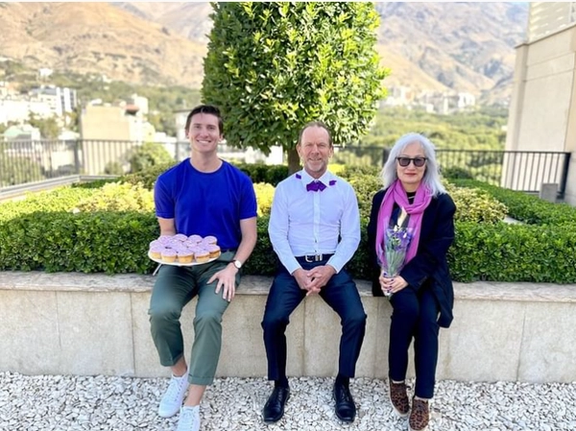
The sentiment was echoed by the German embassy in Tehran, which posted purple hearts in reply to the original post by the Australian embassy.
According to the brief published by Iran’s foreign ministry, the Australian ambassador was asked to take “appropriate measures to compensate” for the Instagram post. “Such actions by the embassy are inconsistent with international law and the Vienna Diplomatic Convention, which governs diplomatic conduct in respect to the host country's laws and regulations,” McConville was told.
Iran's laws allow individuals to change their gender identity markers on government-issued identification cards after gender-affirming surgery and by court permission. Many Islamic Republic apologists portray the country's "tolerance" of transgenders as an expression of liberalism.
However, the Islamic Republic seems to be exploiting the sex-reassignment surgery (SRS) as a means of purging gays and lesbians from public life, as evidenced in a 2019 report by Economist.
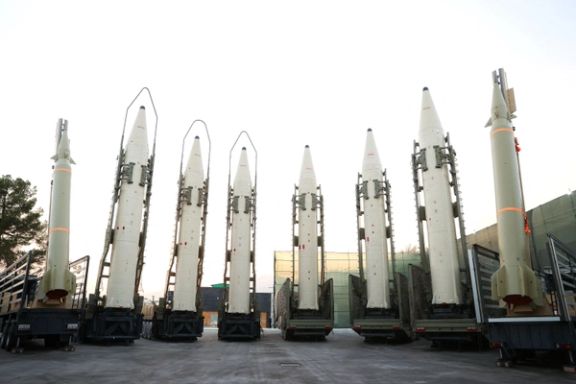
A report by the James Martin Center for Nonproliferation Studies has questioned the true scale of the threat posed by Iran’s ballistic missiles to Israel and potentially other regional countries.
Based on the April assault on Israel in which around 350 missiles, rockets and drones were fired towards the Jewish state, the fact most were intercepted by Israel and a US-coalition, shows only “some ability to strike Israel”, said Sam Lair, from the center.
Speaking to the Associated Press, he said: “If I were supreme leader, I would probably be a little disappointed.”
Lair said that if Iranian missiles are not able to hit targets precisely “that recasts their role”. He added: “They’re no longer as valuable for conducting conventional military operations. They may be more valuable simply as terror weapons.”
The report comes as Iran’s shadow war with Israel has once again peaked in the wake of the assassination of Hamas political leader Ismail Haniyeh in Tehran in July.
Though Israel has not claimed responsibility, it is believed to have been an Israeli missile strike from inside Iran’s borders.
Since the assassination, Iran has threatened to retaliate, but has waited several weeks in a bid to heighten the psychological war against its arch-enemy who is currently in the midst of a multi-front war with Iran’s proxies.
April’s assault was triggered by an alleged Israeli airstrike at the Iranian consulate in Damascus, killing a senior Quds Force commander and several other senior military personnel.
But its retaliation fell short of expectations, with claims from Iran of hitting the Nevatim Air Base falling flat. Instead of hitting the valuable fighter jets and military assets, the attack merely dented some holes in the runway, as seen by footage released by the Israeli military, showing that at least four missiles hit the base.
A team of experts from the James Martin Center for Nonproliferation Studies examined the alleged strike on the base, 65 kilometers south of Jerusalem in the Negev Desert, and said the only debris found in the area, collected from the Dead Sea, suggests Iran used Emad missiles to target Nevatim, the analysts told AP.
The liquid-fueled Emad, or “pillar” in Farsi, is a variant of Iran’s Shahab-3 missile built from a North Korean design with a reported range of 2,000 kilometers. That indicates the Emads were likely fired from the Shiraz area, which is within the estimated limits of the missile’s likely capabilities, the report said.
Based on Iran’s focus on the F-35I, the James Martin analysts assumed the likely target point for the Iranian fire would be a cluster of aircraft hangars. That offers “a much more valuable target” than just “poking holes in the runway,” Lair said. But none of the Iranian missiles directly hit those hangars.
Assuming Iran targeted the hangars, the James Martin analysts measured the distance between the hangars and the impact zones of the missiles. It gave an average of about 1.2 kilometers for the “circular error probable”, a measurement used by experts to determine a weapon’s accuracy based on the radius of a circle that encompasses 50 percent of where the missiles landed.
“This means the Emad is much less accurate than previous estimates indicated,” Lair said. “This indicates the Iranians are a generation behind where previous assessments thought they were in accuracy.”
Former British paratrooper and former Sandhurst senior lecturer, Andrew Fox, said Iran’s capability “is a paper tiger”.
“This is why they created their network of proxies and why the regime so desperately want nuclear weapons,” he said, speaking from Israel. “We know their capabilities from the Iraq-Iran war. They are no match for Israel’s military firepower and defensive strength.”
While Iran’s leaders continue to threaten a follow-up to April’s attack, he said it would be nothing more than “embarrassing”, and risk drawing the US into the battle.
“A far more likely method of revenge against Israel for the Haniyeh assassination is for Iran to use their proxies to stoke tensions in the West Bank and try to create a third intifada,” he said.
US intelligence agencies said in a report in July that Iran has “the largest inventory of ballistic missiles in the region and continues to emphasize improving the accuracy, lethality and reliability of these systems”.
The report from the director of national intelligence also said “Iran probably is incorporating lessons learned” from the April attack.
However, Behnam Ben Taleblu, an American Iranian and a senior fellow at the NGO, the Foundation of Defense of Democracies (FDD), told Iran International that while Iran's progress in its missile program should be looked at in the context of the maturity of the program, it cannot be downplayed.
“In the past few years people have been talking about Iran’s advances, in range and precision, but it has to be seen as relative in terms of the program and capabilities.
“Over the last decade, the missile attacks had not faced defended targets like the April attack against Israel. Never had Iran launched ballistic missiles from its own territory against Israel or against a defended target, and at that long range."
During the Iran-Iraq War, following the West's refusal to help build Iran's capabilities, Tehran significantly ramped up its missile program.
Many strikes have been launched by Iran but the targeted nations have often remained silent either due to a lack of military capability or an unwillingness to respond, as seen in Iraq and Syria. Notably, Pakistan stood out for its swift and decisive response to an Iranian missile attack.
He said the latest report, while important, reads like "more of the same" to those following Iran's progress closely. "It’s an indictment of the medium range systems that employ liquid propellant rather than the short range ones employing solid propellant," he said.
Iran’s medium range, nuclear capability missiles, remain weapons of terror, but with the capability to improve over time, he said, "though that hasn’t been brought to bear yet".
“If we see it as a nuclear delivery vehicle, we must still mention that four to seven missiles still reached Israel. Even if one of those had a nuclear warhead, it could be a game changer. So all of this has to be taken into account."
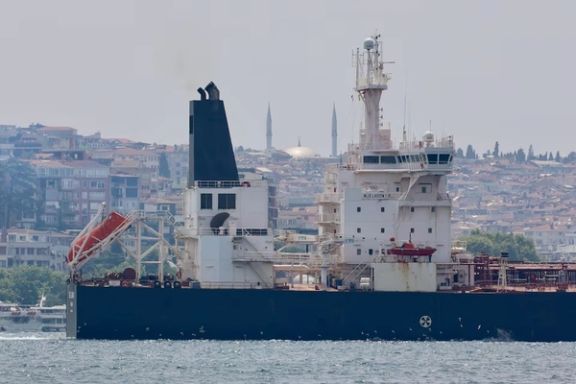
The Iran-backed Houthis in Yemen targeted a crude oil tanker in the Red Sea amidst its blockade targeting global shipping, with a Greek-operated vessel struck in the latest attack.
The US Central Command said in a statement that the Saudi-owned Amjad vessel and the Panama-flagged and Greek-operated Blue Lagoon I were hit in an attack but Saudi Arabia later denied the assessment.
However, Saudi’s national shipping company, Bahri, announced on Tuesday that "Amjad was not targeted and sustained no injuries or damage."
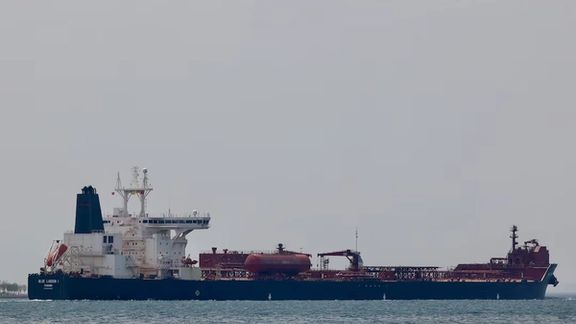
The vessel, which was carrying approximately two million barrels of crude oil, remains seemingly fully operational and is continuing its voyage to its planned destination without interruption.
Bahri emphasized that all relevant authorities were promptly informed, and that the company remains in continuous communication with its crew, closely monitoring the evolving situation.
Iran has vocally supported and praised the Houthis, but rejected claims that it has provided them with arms. The Houthis are a designated terror group by countries including the US and UK.
The US Central Command earlier revealed that the Houthis launched the assault using two ballistic missiles and an unmanned aerial vehicle, striking both vessels, calling the move "reckless acts of terrorism by the Houthis."
Although the Houthis claimed responsibility for targeting the Blue Lagoon with missiles and drones, they made no mention of the Amjad.
The Joint Maritime Information Center, responsible for tracking such incidents, reported that three ballistic missiles hit the Blue Lagoon I tanker 70 nautical miles northwest of the Yemeni port of Saleef.
The center "assesses that Blue Lagoon I was targeted due to other vessels within its company structure making recent port calls in Israel," it said in a report.
"All crew on board are safe. The vessel sustained minimal damage but does not require assistance."
Saudi Arabia, the world’s leading oil exporter, has expressed growing concern over the increased frequency of Houthi attacks on ships in the Red Sea, a maritime corridor for global energy supplies.
The attacks are part of a broader campaign by the Houthis, who have been emboldened by Iran’s support, and have dragged Yemen to become the region's poorest nation after a decade-long war civil war against a Saudi-led coalition.
The recent escalation follows a series of aerial drone and missile strikes by the Houthis, which they claim are in solidarity with Palestinians amid the ongoing conflict in Gaza, in a bid to force Israel into a ceasefire.
The Houthis began targeting maritime commercial traffic in mid-November, following a directive from Iran’s Supreme Leader Ali Khamenei, who urged Muslim nations to impose a blockade on Israel.
Initially concentrated in the Red Sea, these attacks have since spread to other vital waterways, including the Indian Ocean, disrupting international shipping and resulting in the capture of dozens of seafarers.
In response to this growing threat to global trade and freedom of navigation, a US-led coalition of over 20 nations has been formed to counter the blockade. It has seen joint attacks by the UK and US on Houthi infrastructure in Yemen.
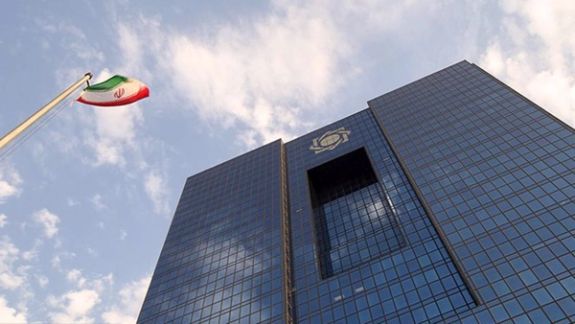
Iran's Central Bank Governor has been summoned by Parliament after reports surfaced of major loans being granted by the country's banks to their own employees and subsidiaries.
Earlier, in response to growing criticism over these loans, the Central Bank released a report on August 30, stating that the total loans provided by banks and credit institutions to their employees, managers, and board members in 2023 amounted to more than 9,100 trillion rials (over $1.5 billion).
Despite this amount of bank loans to their employees and subsidiaries, the Central Bank said that "reviews indicate that, given the issuance of the Central Bank's directives and regulations in this regard, these loans are under controlled management."
Two of the country's most influential banks, Mellat and Sepah Bank, issued the highest volume of loans, providing 190 trillion rials (over $315 million) and 145 trillion rials (over $240 million), respectively, to their subsidiaries last year.
Both banks are notorious for their controversial roles in Tehran’s political and financial arenas, having been accused of supporting military and nuclear programs—activities that have resulted in severe international sanctions. In the face of these sanctions and economic hardships, they have been propped up and kept afloat by Iran's Central Bank.
In reaction to news of the large loans to bank employees and subsidiaries, domestic media have highlighted the significant challenges ordinary citizens face securing loans for housing, marriage, entrepreneurship, and private sector ventures.
State media Khabar Online reported that the loans granted by banks to their employees and subsidiaries are nearly equivalent to the total amount needed for marriage loans for 300,000 people who have been waiting for months with no response from the Central Bank.
On Sunday, semi-official ILNA news agency reported that Jafar Ghaderi, a member of the parliament, mentioned the "distribution of astronomical loans" among bank employees and the "unequal access to loans among the public." He stated that the Governor of the Central Bank and several bank CEOs would be summoned to parliament to provide explanations on this matter.
The report highlights a stark disparity in loan ceilings between different groups. For some bank employees, the loan limit exceeds 10 billion rials (over $16,000), while retirees have a maximum loan limit of only 300 million rials ($500), which is less than what a bank teller earns in a month.
In contrast, tenants seeking rental deposit loans and couples looking for marriage loans face long waiting lists, with the banking system attributing these delays to a lack of financial resources.
Meanwhile, the latest July report from the Codal system indicates that the accumulated losses of Iran's banking system amount to 3,700 trillion rials (over $6 billion).
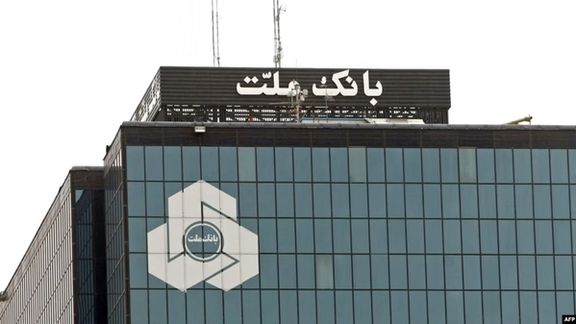
According to a report by Eco Iran on July 10, "the accumulated losses of the country's banking system have exceeded $6 billion, which is more than half of the projected oil revenues for this fiscal year (starting March 21). In other words, addressing the banks' accumulated losses would require at least 50 percent of this year's oil revenues."
The highest recorded accumulated loss belongs to Ayandeh Bank, which has exceeded 1,140 trillion rials nearly ($2 billion).
The latest figures from the Codal system suggest that Melli Bank had an accumulated loss of more than 760 trillion rials (over $1.2 billion) by the end of September last year, ranking second.
Other banks with significant accumulated losses include Sarmayeh, Sepah, Iran Zamin, Shahr, Dey, Keshavarzi, Maskan, Melal Credit Institution, Parsian, Tosee Taavon Bank, and Taavon.
The strike, now in its second month, has spread to more than 50 cities, marking the largest professional protest by nurses in a century. Nurses and emergency medical technicians are protesting against long working shifts, low wages, and mandatory overtime.
Fereydoun Moradi, a member of the Supreme Council of the Nursing System, recently highlighted the issue of unpaid nursing service fees which have not been deposited into nurses' accounts for over a year.
Meanwhile, Health Minister Mohammad Reza Zafarghandi admitted that the government owes nurses more than 70 trillion rials (over $116 billion). Although he said that these dues would be paid promptly, no action has been taken, leaving nurses determined to continue their industrial action.
The situation is further exacerbated by the Iranian government's mismanagement of the National Development Fund (NDF) which was intended for long-term national investments. In a Saturday interview on state TV, President Masoud Pezeshkian announced that, with the approval of Supreme Leader Ali Khamenei, funds from the National Development Fund will be allocated to pay nurses, farmers, teachers, and for essential medicines.
The crisis has also led to a increase in the migration of nurses. Ahmad Nejatian, head of the Nursing Organization, reported that the average annual migration of nurses has doubled between 2021 and 2023. With approximately 20% of nursing students now seeking to leave the country, the trend is expected to worsen, particularly as countries like Germany and Denmark have made it easier for Iranian nurses to migrate.

The exodus, combined with low wages and harsh working conditions, has weakened Iran's healthcare system. The country currently has only 1.5 nurses per 1,000 people, compared to the global average of three. Many nurses report burnout and an inability to provide adequate care to patients, further straining an already fragile system.
Samira Rahi, a journalist based in Turkey who specialises in Iranian social issues, criticized the Iranian government's lack of resolve.
"When nurses demonstrated their dedication during the pandemic, the system took advantage of them. The Islamic Republic relies on temporary fixes to address the issue superficially, but as long as the underlying structural problems remain unresolved, all these measures will be ineffective," she told Iran International.
As the government continues to neglect the demands of its healthcare workers, the future of Iran's nursing profession—and the quality of care available to its citizens—remains uncertain.